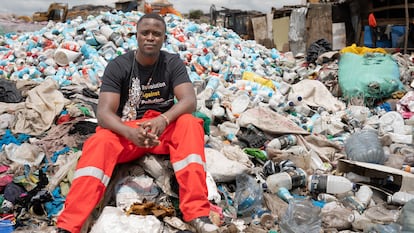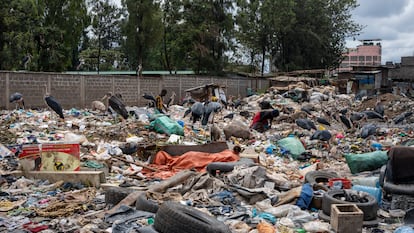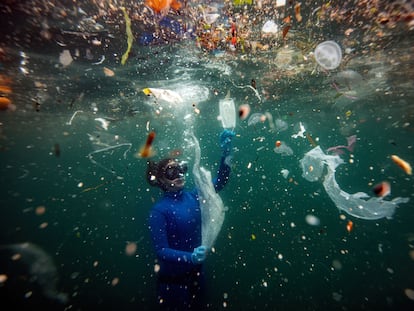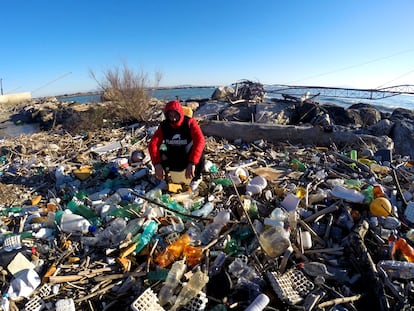‘Plastic recyclers are like ghosts, but we do vital work’
The U.N. is negotiating a new global treaty this week in Nairobi to manage the huge problem posed by plastics. John Chweya, leader of Kenya’s waste pickers, demands a voice for representatives of the world’s 20 million garbage workers


After this interview, Kenyan John Chweya, 33, goes straight to the U.N. headquarters, wearing the same boots and red overalls in which he has spent the morning at Dandora, Nairobi’s main landfill. At this time of year in this giant dump of more than 12 hectares in the Kenyan capital, the ground is a mixture of plastic and mud in which pigs search for scraps. Alongside them, 8,000 recyclers sift through steaming mounds of waste for something to resell. Sometimes they work without boots, but always without gloves, because gloves hinder the process, though in any case gloves are a luxury few could afford.
Chewya has worked here since he was 12 and now heads up Kenya’s waste pickers’ 40,000-strong association. He doesn’t believe in dressing up to mingle with the powers that be at the U.N. headquarters where, this week, the international community will negotiate a major global treaty for plastics. Across the world, around 20 million people work sorting plastic, cans and glass in places where there is no public waste collection. Most do so with no safety guarantees or the assurance of making enough money to eat at the end of the day. “We have to sit at the negotiating table,” Chweya says, standing in front of a huge pile of discarded bottles.
The multilateral treaty being negotiated in Nairobi is, according to the U.N., the most important since the 2015 Paris Climate Accords, with two more conferences scheduled for 2024. The resulting text will regulate the more than 400 million tons of plastic that humanity generates each year, from manufacture to landfill — or sea. Chwewa is well aware that the world is producing more and more plastic. “When I worked at the dump as a child, there was a lot of returnable packaging. Today, plastic is everywhere, even for wrapping fruit in the supermarket,” he says. And, like 91% of the plastic produced in the world, it is plastic that is often not recycled.

Question. How did you start working with garbage?
Answer. My family lived off the second-hand clothing trade. One day, the market where my mother sold burned down and we lost everything. We had taken out loans to pay for the merchandise, so we ended up in a situation where we couldn’t even afford two meals a day. My six siblings and I had to make a living. I ended up collecting metal at the Kisumu dump because plastic, at that time, was not worth much. I was paid seven shillings [four cents] per kilo, sometimes less.
Q. And how is the day-to-day life of a waste picker in Kenya today?
A. I get up at five o’clock. The earlier you start, the more chance you have of finding recyclable waste, and the longer the hours, the more kilos of plastic you gather and the more money you make. I collect garbage from homes. Other recyclers work on the street, and others here, in landfills. What is complicated for all of us is that the middlemen who sell to the recycling companies set prices that change every day, so we are trying to organize ourselves to achieve collective bargaining.
Q. What do recyclers expect from this plastics treaty?
A. This treaty needs to recognize the vital role played by recyclers in fixing the world’s plastic pollution problem. Ideally, the extended responsibility system [whereby the packaging producer takes responsibility for the environmental and social impact of waste] would include recyclers, and we would be paid for our work. Ours is a historic role, because, to be honest, the plastic we’ve already produced is going to be around for the next 100 years. And we are still producing.
Q. How do you feel when you visit the U.N. headquarters?
A. It is a devastating feeling. I walk in and find delegates debating policies that affect my colleagues without being clear about the reality. Most of them have not been here [points to the landfill]. Coming here changes the perspective of what the treaty means.
Q. You are the invisible face of plastic, shall we say.
A. We still suffer a lot of social stigmas. Some people think that because we couldn’t get an education, we are a danger, or we lack knowledge. And governments neither recognize nor support our work enough. We are like ghosts, but we do vital work. It happens all over Africa.
Q. Do you think the conversation around the environment and climate change is elitist?
A. Yes, to some extent. That’s why I think legislators have to come here, to the landfill. They are not familiar with our reality. Also, these debates have to be shaped by knowledge. And we recyclers have that knowledge. We work with plastic, we know it, we feel its effects. We literally live among plastic.
Q. What are some specific requests the recyclers have for the politicians?
A. First, that recyclers get paid for their work instead of having to sell individually. Also that we have some health and safety guarantees. You can see plastic burn here, and the people who breathe that in every day develop respiratory problems. We cut ourselves with glass, with syringes. There are suspicions of cancer, women suffer hormonal problems. For the 8,000 waste pickers at Dandora, for example, we have only managed to get 500 bits of protective equipment.
Sign up for our weekly newsletter to get more English-language news coverage from EL PAÍS USA Edition









































